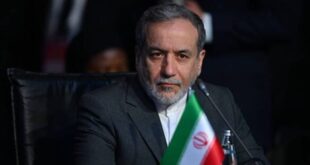VIENNA (AFP) – The UN atomic agency was wrapping up a debate Thursday on Iran’s nuclear programme after both the United States and Europe warned that new UN sanctions loom over fears Tehran seeks atomic weapons.“Iran continues to ignore its obligations and has not taken any steps to build confidence in the exclusively peaceful nature of its programme,” British ambassador John MacGregor had Wednesday told the 35-nation board of governors of the International Atomic Energy Agency (IAEA).
MacGregor, speaking for EU nuclear negotiators Britain, France and Germany, said that while “there is no one in this room who would not like to be convinced” that Iran does not want nuclear weapons, “Iran has prevented progress” each time steps towards restoring confidence were proposed.
US spokesman Matt Boland told reporters that there was “strong support (at the board) for the IAEA’s request that Iran revoke its recent decision to keep inspectors out of its heavy-water reactor (which can make plutonium) and revoke its decision to withhold information on new nuclear facilities. Only Cuba and Venezuela stood with Iran.”
But South Africa, while urging Iran to cooperate more with the IAEA, warned “that taking the matter to the Security Council from the IAEA involves seriouis risks of escalating confrontation which could easily spiral into a dangerous situation for the region and the world,” in a speech by its ambassador Abdul Samad Minty.
The UN Security Council has imposed two rounds of sanctions in a bid to get Iran to halt uranium enrichment — which can make fuel for reactors or for a bomb — and cooperate with an over four-year-old IAEA investigation.
The United States expects intense diplomacy in coming weeks for new sanctions, the US State Department said Monday.
The IAEA meeting continues Thursday, with Iran slated to make the final statement in the nuclear safeguards debate.
IAEA chief Mohamed ElBaradei reported to the board Wednesday that Iran is defying the United Nations by continuing to expand its uranium enrichment work.
German ambassador Peter Gottwald, speaking for the European Union, said this would lead to “further appropriate measures” at the Security Council.
But “the door to negotiations remains open” if Iran complies with Council resolutions, Gottwald said, adding that the EU supports continued talks between its foreign policy chief Javier Solana and Iranian negotiator Ali Larijani.
Iranian President Mahmoud Ahmadinejad had on Wednesday however told cheering crowds in his home province on Wednesday that nuclear energy “belongs to the Iranian nation and the Iranian nation will defend this right with their fists in the air”.
Iran’s IAEA ambassador Ali Asghar Soltanieh told the board that the agency was not mandated to play the role of UN watchdog “as mistakenly publicised these days,” but rather to promote the peaceful use of nuclear energy.
Norma Goicochea, ambassador for Iranian ally Cuba, told reporters that “the agency is technical and this issue has been handled politically and the way it has been handled reflects the priorities of the United States and its allies.”
ElBaradei had said on Monday’s opening day of the meeting that the “brewing confrontation” with Iran over its atomic ambitions must be settled diplomatically.
Tehran denies US accusations that it seeks nuclear weapons, saying it wants only to generate electricity.
Washington says it is looking for a diplomatic solution but has not ruled out military action.
Iran had, as of May 13, over 1,300 centrifuges enriching uranium at the underground, heavily bunkered facility in Natanz, according to ElBaradei.
It could start industrial scale production with 3,000 centrifuges running by the end of June, a senior official close to the IAEA said.
That number could make enough enriched uranium for a bomb in less than a year, experts say.
ElBaradei also estimates that Iran could have 8,000 centrifuges running by December, diplomats said.
 Eurasia Press & News
Eurasia Press & News



